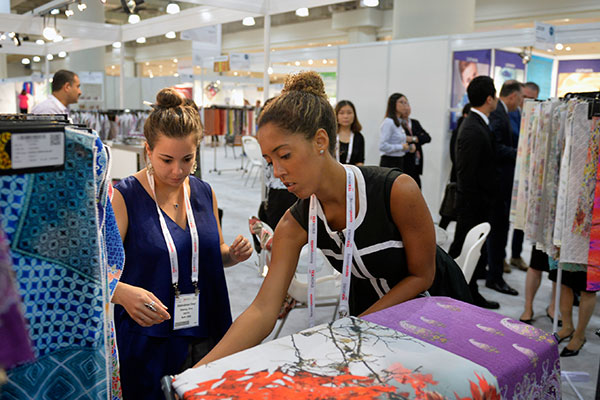Textile exporters take new approach
By Li Jing in New York (China Daily) Updated: 2015-08-06 08:09
 |
|
Two exhibitors display their company's textile products during the international textile and apparel sourcing show at the Jacob K. Javits Convention Center in New York. [Photo / Xinhua] |
Apparel raw material providers in China have had to adapt by using new fabrics to combat labor costs at home
Zhao Miaoqi has witnessed many changes in China's textile industry during the past 40-plus years, and lately they have not been for the better.
"Over the decades, China's textile industry has changed dramatically," Zhao said. "It used to be a booming industry when I was young, but now it is old and declining. As more people (competitors) have flooded into the market, the (profit) margin has been shrinking."
Zhao has managed a fabric company in Ningbo, Zhejiang province since 1979, when China had just started reforms and was opening up. Her company specializes in products for overseas retail brands such as Zara, part of the Inditex Group in Spain, the world's largest apparel retailer, and Adidas AG, the German multinational corporation that designs and manufactures sportswear.
Last year, her company's orders in the United States fell by 30 percent. "I'm 75 years old and I'm coming all the way to visit the market to study the reasons behind the slump," she said.
Zhao attended a three-day international textile and apparel sourcing show at the Jacob K. Javits Convention Center in New York on July 21-23, which attracted more than 600 Chinese companies - 30 percent more than last year.
Zhao's company, like others from China, is looking to establish new niche markets in the US.
China is a significant player in the global textiles markets. According to statistics from the World Trade Organization, the market was worth $766 billion in 2013. China holds a commanding market share of 37 percent, worth $284 billion. India is second, with a 4.7 percent share.
The low cost of business due to cheap labor has been the main reason why the textile industry in China has enjoyed extraordinary growth.
But today, China is no longer the cheapest producer. With the average wage of the 23 million textile workers in China reaching 4,000 yuan ($650) a month, garment-factory owners are starting to face financial pressure.
Zhao's grandson, Zhu Jing, manger of Ningbo Aoqi Technological Knitting Co, said the minimum wage is growing by 10 percent a year.
"By only offering the minimum wage, you can never recruit a skilled worker," he said. "As China has more rigid regulations on labor protection, employers must pay more for extra working hours."
In contrast, factories in emerging countries such as Vietnam and Cambodia have very low labor costs.
"Factories there offer as low of a salary as 300 yuan a month for textile workers, which is much lower than 4,000 to 5,000 yuan in China," Zhu said. "As they don't have rigid regulations, they force workers to work longer than required ... or hire some child laborers in order to cut cost."
- 2015 China International Fair for Investment and Trade kicks off in Xiamen
- China's commodity imports robust in Jan-Aug period
- China stocks rebound 2.92%
- 2015 China box office already past 2014 total
- China foreign trade decline widens in August
- Interview: JP Morgan's senior executive bullish on China
- Innovation, development the focus for NZ mayors
- Lives of freelancers

















